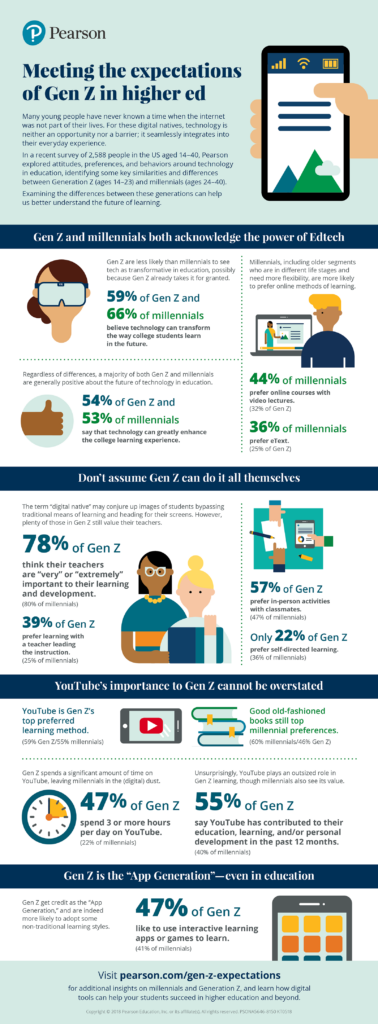Generation Z
Overview and Introduction: The WHAT and WHO
Generation Z (also known as Gen Z; Zoomers) are today’s college students, born between 1996 and 2010, who have unique defining moments, attitudes, communication preferences, values, and aspirations than preceding generations. They are intelligent and motivated to make a change; they are efficient in their use of personal resources. The below guide is focused on Gen Z in the United States.

Source: https://www.pearson.com/ped-blogs/blogs/2018/05/generation-z-millennials-expect-technology-education.html
Key Attributes
- Most diverse generation [1] with the US Hispanic population growing four times the rate of the total population between 2004-2010 [2]
- More interracial than any other generation
- High level of anxiety, even before the pandemic
- 16% have been diagnosed with ADHD [3]
- They have been raised by Gen X’ers and some Millennials
-
- They have been raised with and on technology
- They have been very protected by and are very close with their parents
-
Defining Moments of Gen Z
- COVID-19. We don’t know all of the ways this is going to impact this generation, but it has certainly fed into their already high levels of anxiety. One-third of Gen Z reported worse mental health during COVID [4].
- Post 9/11. Also called the Homeland generation; there has always been global terrorism.
- Great Recession. They are fiscally conservative; they pay attention to what they are getting for their money.
- Climate Change. Many (41%) cite global warming as the most important issue facing the world [5].
- Black Lives Matter Movement. The vast majority (90%) support BLM [6]. They were called to action by injustice, but they don’t believe marching is the only way to be involved. They use their money to support brands that support their beliefs [7]
- 12% attended a protest
- 41% posted on social media
- 46% have made an effort to learn
- 82% agree that racism is a major problem; 79% agree that black Americans are frequently discriminated against
- Pre-Election/Election. Trust in government has fallen and trust in the news media fell 13% between April and June 2020 [7].
Aspirations: Security and Stability
Gen Z grew up practicing active shooter and sniper drills more than fire drills. Half of Gen Z members believe school shootings will have a greater impact than having the first African American president. This generation was also raised by “Latchkey kids” – their parents gave them the safety and stability that they didn’t feel in their own childhoods. Gen Z also report that COVID-19 was a significant stressor and 81% say that school changes during COVID negatively impacted them [8].
Attitude Toward Technology: Private Technoholics
Gen Z members reach for electronics every 7 minutes. They also spend more time on their smartphones than Millenials, at 15.4 hours a week, versus 14.8 hours [9]. They could be described as technoholics and value security in their technology. They use technology to learn about things and other people, but they don’t share information about themselves.
Communication Preference: F2F
The majority of Gen Z prefer face to face interactions (83%) in their communication. There tends to be a very small window to get their attention (5-8 seconds) and this can be seen in the short, edgy messages that are popularized on TikTok (15 second videos) and Twitter (140 characters).
Attitude Toward Education and Career
The majority of Gen Z members (66%) say their number one concern is college debt [10]. Most (75%) also say there are ways to get a good education without going to college [10]. They are entrepreneurial and most (60%) want to change the world, more so than the Millennial generation, where 39% reported this attitude. Gen Z members want to make a difference and aspire to work anywhere, with anyone, at any time.
Understanding the unique learning needs, experiences, and motivations of Gen Z can help all faculty to think creatively in their approach to teaching this generation.

 Implementation and Timing: The WHEN, WHERE, and HOW
Implementation and Timing: The WHEN, WHERE, and HOW
In your class, Gen Z may have little or low tolerance for being without digital resources. There are a myriad of ways to implement educational technology to engage them. These students benefit from hands-on experiences and the autonomy to explore topics that interest them in more depth.
What Gen Z Needs
- Understand the value. Provide real-world applications and incorporate understanding of impact and why their work matters.
- Hands-on experiences. Their ideal learning environment is one that incorporates independent and hands-on work with engaging instructors and supportive peers.
- Safe environment to try (and fail). Understanding that failure is part of the learning process is key. They may need help to ease their anxiety about failing.
- Meddler-in-the-middle. This is in contrast to the Sage-on-the-stage model of lecture based courses. Education is less about the transfer of knowledge from faculty to students and more about helping students make sense of the overabundance of information. Faculty can be doing tasks right along with the students and modeling to them that it is okay to make mistakes. A focus can be a balance between providing information and allowing students to work on assignments.
- Transparency. Gen Z members need faculty who will be transparent in the learning process. This includes being upfront about not knowing everything, but willing to reach out and search for the right resource to find answers.
Implementation Strategies
- Provide clear directions
- Think digital: consider how technology be integrated to assignments, assessments, activities
- Fast delivery of content and graphics
- Ongoing, timely feedback
- “Bite-sized” information
- Allow for face to face communication
- Understand commitments outside of school
- Acknowledge that failure is apart of learning
Gen Z Student Quotes – What are faculty doing well? How can faculty support student success?
Below are a few select quotes from Gen Z students that were collected by Cindy Boglin, Assistant Director for Academic Services within the Polytechnic School. Students were asked to share what faculty are doing well in their engineering courses at the Fulton Schools of Engineering at ASU and how faculty can support their success.
- “Really cares for the students and the material! Bridges the gap between academia and industry flawlessly!”
- “Have the students find the best resources and share with class.”
- “Give students great opportunities to present their thoughts and voices.”
- “Enthusiastic about subject matter and could communicate to the students well. Also was extremely understanding toward outside circumstances like jobs and commutes and was always willing and available to help with any questions.”
- “Understand the anxiety attached to office hours or being called on in class.”
- “Integrate a socially conscious curriculum.”

 Rationale and Research: The WHY
Rationale and Research: The WHY
The evidence-based practices that are encouraged for teaching Gen Z are best practices for teaching all learners [11]. By considering approaches for communication, technology preference, safety, and hands-on experiences, faculty can improve all learner engagement and comprehension in their classroom. These techniques may also improve course evaluations (see our Improving Course Evaluations Quick-Reference Guide for additional strategies).

 Additional Resources and References
Additional Resources and References
Interested in learning more? Here are additional video resources and references on Gen Z from this guide.
- Generation Z: Making a Difference Their Way | Corey Seemiller | TEDxDayton
- What Generation Z can teach adults in the new world of work? | Lisa Gunnarsson | TEDxStockholm
- What do we know about the generation after millennials? | Jason Dorsey | TEDxHouston
- Generation Z – Who are we?
References
[1] Parker, K., & Igielnik, R. (2022, March 4). What we know about gen Z so far. Pew Research Center’s Social & Demographic Trends Project. https://www.pewresearch.org/social-trends/2020/05/14/on-the-cusp-of-adulthood-and-facing-an-uncertain-future-what-we-know-about-gen-z-so-far-2/
[2] US Census Bureau Public Information Office. (2016, May 19). 2010 census shows nation’s Hispanic population grew four times faster than total U.S. population – 2010 census – newsroom – U.S. census bureau. United States Census Bureau. https://www.census.gov/newsroom/releases/archives/2010_census/cb11-cn146.html
[3] The impact of attention deficit hyperactivity disorder on the Health of America’s Children. Blue Cross Blue Shield. (2019, March 28). https://www.bcbs.com/the-health-of-america/reports/impact-of-adhd-attention-deficit-hyperactivity-disorder-on-health-of-americas-children#:~:text=Attention%20deficit%20hyperactivity%20disorder%20
[4] Gen Z 100. The Harris Poll. (2021, May 11). Retrieved March 10, 2022, from https://theharrispoll.com/the-harris-z-tracker/
[5] Barbiroglio, E. (2019, December 10). Generation Z fears climate change more than anything else. Forbes. https://www.forbes.com/sites/emanuelabarbiroglio/2019/12/09/generation-z-fears-climate-change-more-than-anything-else/?sh=3f62c196501
[6] Davis, D.-M. (2020, June 10). The action generation: How gen Z really feels about race, equality, and its role in the historic George Floyd protests, based on a survey of 39,000 Young Americans. Business Insider. https://www.businessinsider.com/how-gen-z-feels-about-george-floyd-protests-2020-6?r=US&IR=T
[7] Covid-19, election, racism and more intersect as massive stressors, particularly for gen Z. Healio. (2020, October 20). https://www.healio.com/news/psychiatry/20201020/covid19-election-racism-and-more-intersect-as-massive-stressors-particularly-for-gen-z
[8] Jenkins, R. (n.d.a). How generation Z uses technology and Social Media. Ryan Jenkins Next Generation Catalyst, Speaker & Blogger. https://blog.ryan-jenkins.com/how-generation-z-uses-technology-and-social-media
[9] Laughlin, N. (2020, July 6). How 2020 is impacting Gen z’s worldview. Morning Consult. https://morningconsult.com/form/gen-z-worldview-tracker/
[10] Jenkins, R. (n.d.b). This is why generation Z will skip college. Ryan Jenkins Next Generation Catalyst, Speaker & Blogger. Retrieved March 10, 2022, from https://blog.ryan-jenkins.com/this-is-why-generation-z-will-skip-college
[11] Northern Illinois University Center for Innovative Teaching and Learning. (2020). Generation Z. In Instructional guide for university faculty and teaching assistants. Retrieved from https://www.niu.edu/citl/resources/guides/instructional-guide
